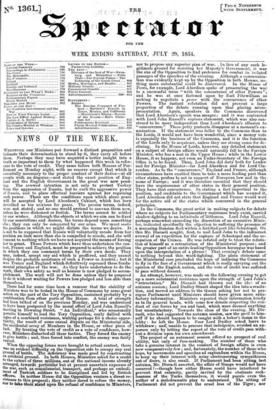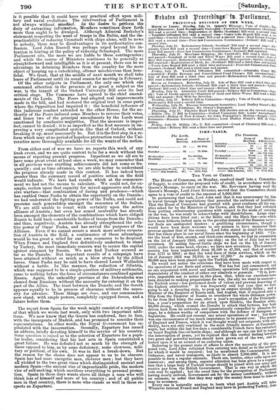NEWS OF THE WEEK.
WHENEVER, our Ministers put forward a distinct proposition and intimate their determination to stand by it, they carry all before them. Perhaps they may have acquired a better insight into a troth so important to them .by what happened this week iarefer- enoe to the vote of credit. They came before both Houses of Par- liament on Monday night, with no reserve except that which is essentially' necessary to the proper conduct of their duties—at all • events with no disguise—and stated the exact position of Eng- land and the English Government in the great war now pend- ing. The avowed intention .is ,not only to protect Turkey from the aggression of Russia, but to .curb the aggressive power of Russia, and to place effectual barriers against her regaining such power.. These are the conditions upon which alone peace will be accepted by Lord Aberdeen's Cabinet, which has been described as too anxious for peace. The precise terms, indeed, were not stated; and no one would pretend to canvass them now, unless he were dishonest or foolish. The terms cannot be settled by our wishes. Although the objects at which we aim can be fixed by our convictions and desires, the terms depend upon something else ; they can only be conquered by our arms. We must make the positaons in which we might dictate the terms we desire. It is not to be supposed that Russia will voluntarily recede from her position an inch more than she is compelled to recede, and she will consent to nothing which we have not acquired the means of forcing her to grant. Those Powers which have thus undertaken the con- test, France and England, must be prepared to achieve the position in which they can command, terms by their own deeds. TheY, may, indeed, accept any aid which is proffered, and they cannot despise the probable assistance of such a Power as Austria ; but it was France and England which definitively espoused these funda- mental principles of the war. As they have undertaken to do the'" work, their own safety as well as honour is now pledged to accom- plishment. The work will not be done unless they be prepared to do it without waiting for Powers less pledged and less able than themselves.
There had for some time been a rumour that the stability of Ministers was to be tested in the House of Commons by some,great action on the part of the Tory Opposition, sustained probably by a combination from other parts of the House. A trial of strength laid been talked of on the previous Monday, and was understood to have been postponed by the moral effect of Lord John Russell's meeting in Downing Street. "An Individual," who occasionally permits himself to lead the Tory Opposition, coyly dallied with signs of a combined resistanoc, waiting perhaps for a choice oppor- tunity, the result of some casual dispute on the Ministerial side, the accidental array of Members in the House, or other piece of luck. lly treating the vote of credit as a vote of confidence, how- ever, Ministers disturbedall these tactics. They foroed the enemy fo give battle ; and, thus forced into conflict, the enemy was fairly routed.
When the opposing forces were brought to actual Contest, there was an evident difficulty on the Opposition side to occupy any real ground of battle. The deficiency Was made good by constructing an artificial ground. In both Houses, Ministers asked for a credit to the extent of three millions, out of the national income already' arranged, towards partimilar but at present uncertain expenses of the War, such 'as commissariat; transport, and perhaps an embodi- ment of Turkish soldiers to be disciplined and -led by British °Seers. In neither House did the .Opposition.venture•a direet re- sistance to this proposal; they neither dared to refuse the money, her to take their stand upon the refusal of Confidence to Ministers, nor to propose any, superior plan of war. In,lieu of any suit le- gitimate groond for resisting her Majesty's Government, it was
the cue of the Opposition to find pretences for combat in isolated passages of the speeches of the evening. Although a communica- tion was evidently kept up by the Opposition in both Houses, no- thing more substantial could be discovered. In the House of Peers, for example, Lord Aberdeen spoke of prosecuting the war to a successful issue "with the concurrence of other Powers"; and he was at once fastened upon by Earl Fitzwilliam as seeking to negotiate a peace with the concurrence of other Powers. The instant refutation did not prevent a large proportion of the debate running upon that glaring misre-
presentation. Again, speakers in the Commons discovered that Lord Aberdeen's speech was meagre.; and it was contrasted
with Lord John Russell's copious statement, which was also con- strued to be more independent than Lord Aberdeen's allusion to "concurrence." These petty pretexts disappear at a moment's ex- amination. If the statement was fuller to the Commons than to the Lords, it would not have been wonderful, since a money vote is especially the business of the Commons, and it is the function of the Lords only to acquiesce, unless they see strong cause for de- clining. In the House of Lords, however, any detailed Statement on a subject of foreign affairs would naturally fall to the Foreign Minister, who has a seat in the Upper House ; while in the Lower House, it so happens, not even an Under-Secretary of the Foreign Office is to be found. Thus, Lord John did duty both for Leader and for Foreign Minister—for Lord Aberdeen and for Lord Cla- rendon. As to the " concurrence," England and France, although circumstances have enabled them to take a more leading part than other states, profess to net in support of European law ancl in the name of Europe ; and it was therefore essential that they should have the acquiescence of other states in their general position. They have that concurrence. In stating a fact important to the position, and creditable to the Government which has secured it, Lord Aberdeen did not state that England and France would wait for the active aid of the states which concurred in the general principles. In the Commons, the great artist in making subjects for debate where no subjects for Parliamentary resistance truly exist, oarried shadow-fighting to an infinitude of littleness. Lord. John Russell, perhaps somewhat exceeding the discretion of an exeoutive•Minis- ter, indicated specifically the objection to suffering the presence of a menacing Russian fleet within a fortified port like Sebastopol. On this Mr. Disraeli sought, first, to nail Lord John to the indiscreet avowal of an expedition for the capture of Sebastopol and the oc- cupation of the Crimea. He was refuted only to treat the refuta- tion of himself as a retractatien of the Ministerial purpose ; and the greater part of an entire leading Opposition harangue was based upon the interpretation of a phrase! That evening's debate came to nothing beyond this word-fighting. The plain statement of the Ministerial case precluded the hope of inducing the Commons to fly in the face of a Government which is really carrying out the opinion of the English nation, and the vote of credit was suffered to pass without dissent. An attempt, however, was made on the following evening to get np a more substantial resistance upon the strength of Lord John's
"retractation." Mr. Disraeli had thrown out the ide-. of an autumn session; Lord Dudley Stuart shaped 'the idea into a resolu- tien, and. moved an address to the Queen asking her not to pro- rogue Parliament until Ministers should have given more satis- faaory information: Ministers repeated their information briefly . as to its general heads, with some few details respecting the con- duct of our forces by sea and land, which were deemed anything
bat unsatisfactory. Towards the close of the evening, Mr. Dis- raeli, who had suggested the autumn session, saw the peril to him- self if he should happen to be caught with .a baker's dozen in the lobby : he left the House. Poor Lord Dudley asked leave to withdraw; and; unable to procure that indulgence, avoided an ex- posure only by letting the report of the vote of Oredit pass with- out a division upon his own amendment. The project of an autumnal session offered no prospect of real utility, but only of fuss-making. The number of those who take a genuine interest in the conduct of foreign affairs is even now comparatively few ; and, fortunately, the number of those who hope, by movements and speeches ad captandum within the House, to keep up their interest with noisy electioneering sympathizers out of doors, is also small. If Parliament had been sitting last autumn, Mr. Disraeli asserted, the affair of Sinope would not have occurred !—though how either House could have interfered to prevent that calamity, partly invited by the obstinate reck- lessness of the Turks themselves, it. would puzzle even the author of a Melodramatic play to understand. The sitting of Parliament did not prevent the cruel loss of the Tiger ; nor is it possible that it could have any practical effect upon mili- tary and naval evolutions. The intervention of Parliament is not always without mischief. In the desire to, petform the- duty of extracting information, Members sometimes draw forth more than ought to be divulged. Although Admiral Berkeley's statement respecting the want of troops in the Baltic, and the im- practicability of reducing Cronstadt with ships alone, will be news to nobody, there may be disadvantages in its authoritative con- fession. Lord John Russell was perhaps urged beyond his in- tention in hinting at the policy of reducing Sebastopol The more Parliament sits, the more we are liable to these contingencies ; and while the course of Ministers continues to be generally as straightforward and intelligible as it is at present, there can be no advantage in detaining Members from the country for the mere object of keeping up a catechizing, oftener mischievous than bene- ficial. We trust, that at the middle of next month we shall take leave of Parliament until its usual season for meeting in February. Of the other subjects in Parliament, the only one which can command attention in the presence of so great a subject as the war, is the transit of the Oxford University Bill over its last critical stage. The Commons have agreed to the chief amend- ments of the Lords. The Peers had adopted real improvements made in the bill, and had restored the original text in some parts where the Opposition had impaired it : the beneficial influence of this judicious conduct extended to the other House, for the au- thority of the Peers induced some Members to reverse their votes, and hence two of the principal amendments by the Lords were sanctioned by conclusive majorities. That the measure is imper- fect, cannot be denied : it is as imperfect as the first measure in im- proving a very complicated system like that of Oxford, without breaking it up, must necessarily be. But it is the first step in a re- form which may at no period of hopeless protraction render the Uni- versities more thoroughly available for all the wants of the nation.



































 Previous page
Previous page